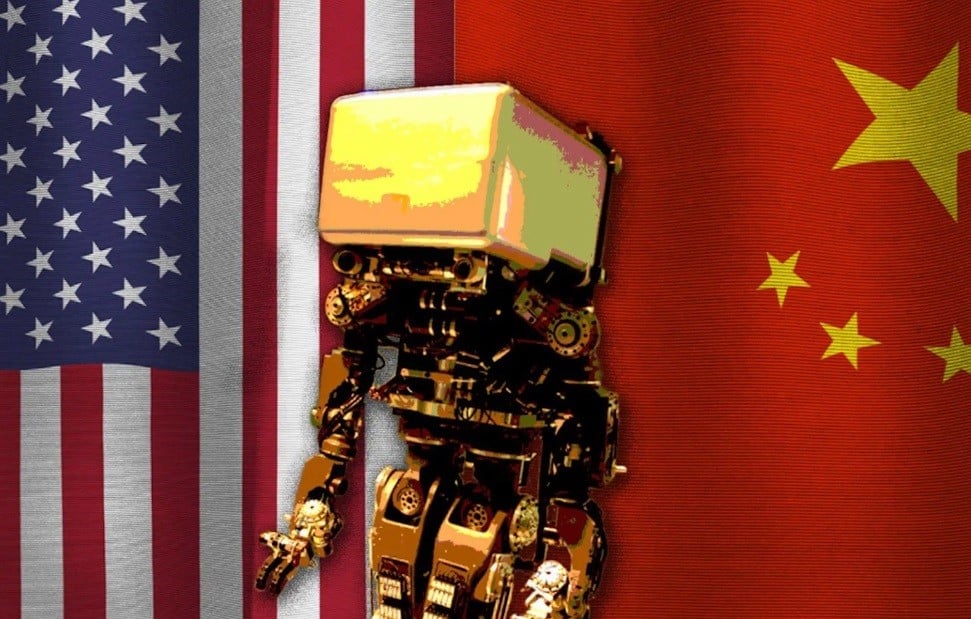Observers have differing opinions regarding the agreement between the US and China concerning the application of artificial intelligence (AI) in the military .
 |
| Observers have differing opinions regarding the agreement between the US and China concerning the application of artificial intelligence (AI) in the military. (Source: Asia Times) |
Following the meeting between US President Joe Biden and Chinese President Xi Jinping on November 16th (Vietnam time) on the sidelines of the Asia-Pacific Economic Cooperation (APEC) 2023 Summit in San Francisco, California, the two countries achieved several important results, including agreeing to resume military contact, cooperate in combating drug trafficking (especially fentanyl), and discuss the risks and measures for managing the safety of artificial intelligence (AI).
In a press conference following the US-China summit, US President Joe Biden stated: “We will bring together experts to discuss the risks and safety issues associated with the application of artificial intelligence. When I work with world leaders, they all raise the issue of the impact of artificial intelligence. These are concrete steps in the right direction to determine what is necessary, the level of danger, and what is acceptable.”
The Biden administration recently issued its first executive order on artificial intelligence and strongly promoted global standards for the use of AI in the military. China has also shown signs of willingness to discuss the matter, particularly regarding the ban on the use of AI in its nuclear weapons command and control (C2) systems.
Although President Biden and the White House announcement did not explicitly state the link between AI and nuclear weapons, experts believed that this was a key topic of discussion between the US and China prior to the meeting.
Bonnie Glaser, who heads the Indo-Pacific program at the German Marshall Fund, commented: "China is interested in participating in discussions to establish rules and standards for AI, and we should welcome that."
This is not just a problem for the US and China.
After the SCMP , citing anonymous sources, reported that "US President Joe Biden and Chinese President Xi Jinping are ready to commit to banning the use of AI in autonomous weapons systems, including its use in controlling drones (UAVs) and controlling and deploying nuclear warheads," public opinion raised hopes for a joint statement between the US and China on this issue.
However, there are no indications that either China or the US will accept binding restrictions on their freedom of action in the field of AI.
This isn't just a matter for the US and China. Since February 2023, after the US issued its "Policy Statement on the Responsible Use of Artificial Intelligence for the Military," it has been campaigning towards building a global consensus on the development and use of military AI, applying not only to autonomous weapons like UAVs but also to applications using algorithms for intelligence analysis or logistics software.
The US aim is to counter calls from many peace activists and non-aligned nations for a binding ban on "killer robots," thereby creating an opportunity for the US and its allies to use AI "responsibly," a rapidly developing technology with wide-ranging applications.
Also in February 2023, the Pentagon undertook a sweeping overhaul of its policy on military AI and autonomous systems. Following this, Ambassador Bonnie Denise Jenkins, Under Secretary of State for Arms Control and International Security, released a “Political Statement on the Responsible Use of Artificial Intelligence and Autonomy in the Military” at the Responsible Artificial Intelligence in the Military (REAIM) Summit in The Hague in February 2023.
The purpose of this Statement is to outline the U.S. approach, which is to gain international consensus, whereby the military can responsibly integrate AI and autonomy into military operations.
Since then, many other countries have voiced their support for the US, including key allies such as Australia, the UK, France, Germany, and South Korea, as well as countries like Hungary, Libya, and Turkey. On November 14th, Yonhap news agency reported that the US and 45 other countries issued a joint statement highlighting the "responsible" use of AI in the military.
Some conflicting opinions emerged following the meeting between the two leaders, including assessments of the US-China agreement regarding the application of artificial intelligence in the military. While some argued it was necessary, others believed Washington was relinquishing its advantage. Christopher Alexander, Director of Analysis at the Pioneer Development Group, questioned the need for this agreement, pointing out that the US would be giving up its current strategic advantage.
"This is a bad decision. China lags behind the U.S. in artificial intelligence technology. Therefore, going through with this deal means the Biden administration is giving up its strategic advantage," Alexander said.
Commentator Samuel Mangold-Lenett also questioned whether China would respect such an agreement, pointing to its lack of compliance with the Paris Climate Agreement. Meanwhile, Phil Siegel, founder of the CAPTRS Center, argued that such an agreement is necessary, although he noted that major powers like Russia should also be included.
What does Beijing want?
Unsurprisingly, China has yet to accept the U.S. approach. Expert Tong Zhao stated, “The country’s diplomatic strategy remains focused on competing with and counterbalancing U.S. efforts to establish future AI governance standards, particularly in the military sector.”
Furthermore, according to this expert, in managing new military technologies, China frequently opposes the endorsement of "responsible" practices, arguing that this is a "political concept lacking clarity and objectivity."
Catherine Connolly, a researcher at Stop Killer Robots, an international organization that brings together NGOs seeking to ban autonomous lethal weapons, said: “Clearly, we expect the U.S. to move toward clear and strong support for establishing legal frameworks to restrict autonomous weapon systems. We think political guidance and pronouncements are not enough, and neither are most countries.”
Recently, the Group of Leading Government Experts (GGE) on automated weapons has repeatedly held discussions in Geneva on related issues, aiming to propose the development and implementation of a law on this type of weapon, similar to what was previously applied to chemical weapons. However, to date, these efforts have been unsuccessful due to a lack of consensus among the participating countries.
Therefore, the anti-AI weapons movement proposed a draft resolution to the United Nations General Assembly in New York. Instead of calling for an immediate ban—which would almost certainly fail—the resolution, proposed by Austria, merely “requests the UN Secretary-General to seek the views of member states.”
As a result, on November 1, 2023, the United Nations General Assembly adopted Resolution L.56, the first resolution on autonomous weapons, which emphasized “the urgent need of the international community to address the challenges and concerns posed by autonomous weapon systems.” Businesses, academic researchers, and non-governmental organizations submitted reports and officially placed the issue on the UN agenda.
Resolution L.56 was passed with 164 votes in favor, 5 against, and 8 abstentions. China was the only country to abstain.
Researcher Catherine Connolly believes that the fact that the US and most other countries voted in favor is a positive sign, but it is regrettable that China abstained.
However, regarding this Resolution, there are some aspects that China disagrees with concerning its characteristics and definitions. In fact, Beijing tends to use a single, narrow definition of "autonomous weapons," one that only considers systems that, once deployed, are "unsupervised and unstoppable." This leads China to claim support for the ban, while in reality it excludes most of the autonomous systems that many countries' militaries are currently researching and developing.
Scholar James Lewis argues that while UN General Assembly resolutions are not binding, if the US can enlist other countries like the UK, France, and possibly the EU into a comprehensive effort, progress could be made in establishing rules in this area.
To date, international discussions on a non-binding “political declaration” have actually forced Washington to tone down its ambitions by removing a section relating to granting AI the ability to control nuclear weapons.
Source






![[Photo] General Secretary To Lam presides over a meeting with the Editorial Teams to summarize 100 years of the Party's leadership of the Vietnamese revolution and 40 years of implementing the National Construction Program.](https://vphoto.vietnam.vn/thumb/1200x675/vietnam/resource/IMAGE/2026/03/04/1772601288977_a1-bnd-8134-7576-jpg.webp)


































































![[Photo] Prime Minister Pham Minh Chinh presides over the regular Government meeting in February.](https://vphoto.vietnam.vn/thumb/402x226/vietnam/resource/IMAGE/2026/03/04/1772606688233_ndo_br_42i9852-jpg.webp)




































Comment (0)